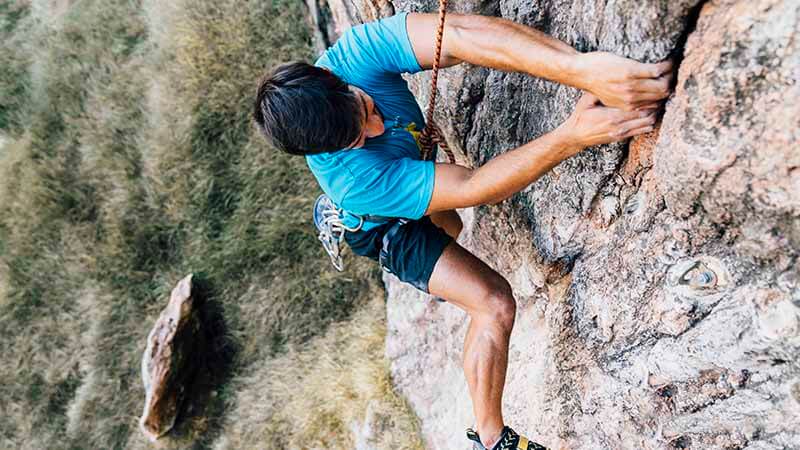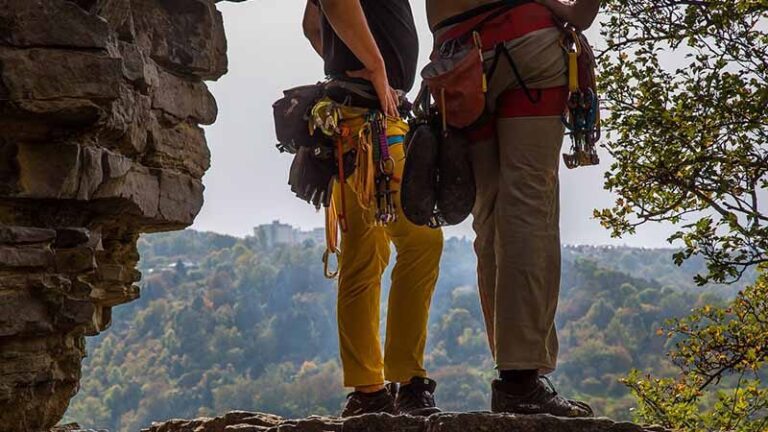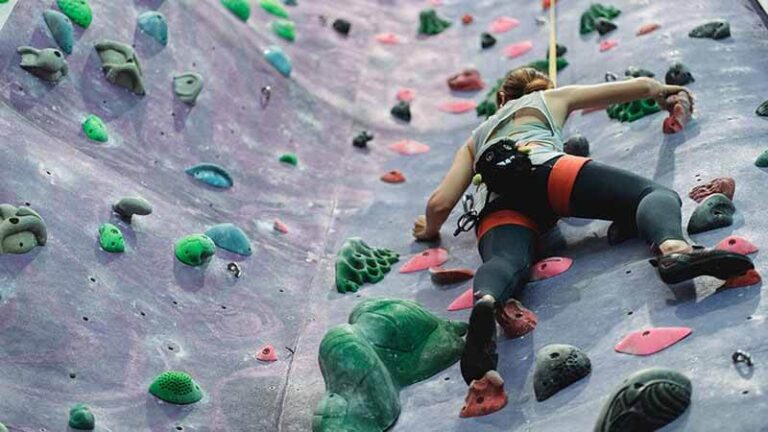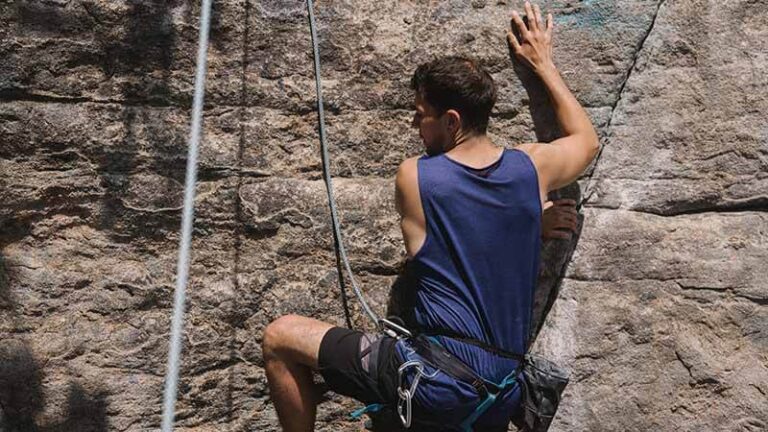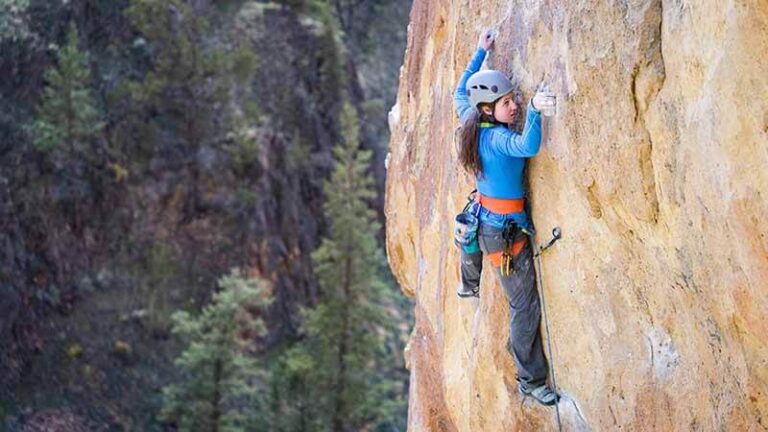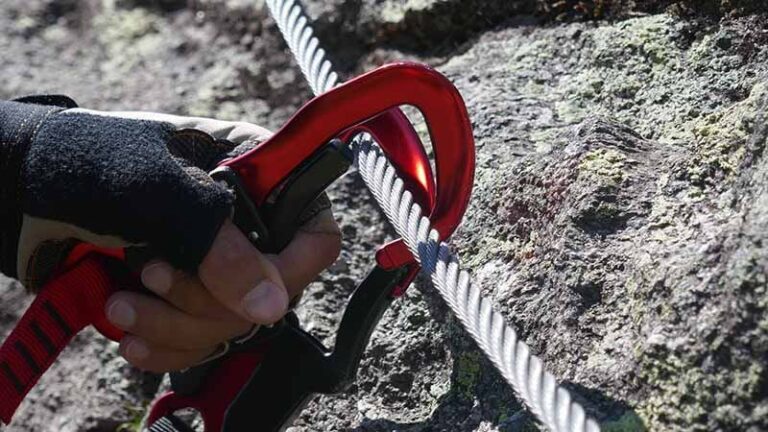What are the Benefits of Rock Climbing?
Rock climbing is a popular sport that includes scaling up and down natural or man-made rock formations using specialized equipment such as ropes, harnesses, climbing shoes, and other safety equipment. Indoors or outdoors, rock climbing can range from simple boulder problems to multi-pitch ascents of towering cliffs.
Strength, endurance, balance, flexibility, problem-solving, and attention are among the physical and mental talents required for the sport. Climbers must have a thorough awareness of the sport’s equipment and tactics and the capacity to assess and manage danger in a dynamic, ever-changing environment.
Rock climbing has a long and rich history, reaching back to the late 1800s. Sport climbing, classical climbing, bouldering, ice climbing, and alpine climbing have all grown into highly technical and specialized activities over time.
Rock climbing is an exciting and adventurous sport that provides numerous physical and emotional benefits. Individuals who participate in this sport can improve their physical fitness, mental focus, problem-solving skills, and self-confidence.
Furthermore, rock climbing promotes community and social interaction, making it an ideal activity for those seeking adventure and new experiences. Regardless of the concerns, good training and safety precautions can help lessen these risks and ensure a safe and rewarding experience for all.
Physical Benefits of Rock Climbing
Climbing rocks is a wonderful approach to enhancing physical fitness and reaping a variety of health advantages. Here are some of the most important physical advantages of rock climbing:
Strengthening of the upper and lower body
Rock climbing works out several muscle groups in the body, including the arms, shoulders, back, core, and legs. Pulling, pushing, and gripping repeatedly when climbing builds strength and endurance in these muscular groups, resulting in greater overall fitness.
Improvement of cardiovascular health
Rock climbing is a high-intensity aerobic sport that increases heart rate and blood flow throughout the body. This increased cardiovascular activity can enhance overall heart health by increasing lung capacity, lowering blood pressure, and improving circulation.
Increased flexibility
Rock climbing requires a lot of stretching and reaching, which helps to develop joint flexibility and range of motion. Regular climbing can result in enhanced joint mobility, decreased chance of injury, and improved overall flexibility over time.
Enhances body composition and weight management
Rock climbing is a physically hard and calorie-burning activity. Climbing can help you gain lean muscle mass, lose fat, and enhance your overall body composition. Climbing on a regular basis might also help with weight management and maintaining a healthy body mass index (BMI).
Mental Benefits of Rock Climbing
Rock climbing not only has physical benefits, but it also has a number of mental health benefits. Here are some of the most important mental benefits of rock climbing:
Reducing stress and anxiety
Climbing may be an excellent stress reliever since it allows climbers to escape from the stresses of everyday life and focus on the current moment. Physical activity, exposure to nature, and the need to focus on the work at hand can all assist to alleviate stress and anxiety.
Enhancing mental focus
Climbing rocks necessitates a high level of mental attention and concentration. Climbers must maintain concentration while assessing the route, planning moves, and making split-second decisions. Climbing on a regular basis can help to increase mental focus and concentration in other areas of life.
Boosting self-confidence and self-esteem
Rock climbing can be a difficult and daunting activity, yet completing a climb can be an extremely rewarding experience. Climbing a tough route can promote self-confidence and self-esteem, leading to greater mental health and well-being.
Promoting problem-solving skills
Climbers must assess the route, plan their moves, and make corrections on the fly, which necessitates problem-solving abilities. Climbing regularly can assist in developing problem-solving abilities, which can then be used for other aspects of life, such as job or personal relationships.
Social Benefits of Rock Climbing
Rock climbing is not only a solo sport, but it can also be a very social pastime. Here are some of the most important social benefits of rock climbing:
Building teamwork skills
Climbing can be a fantastic approach to improving collaboration skills because climbers frequently rely on one another for support and help. Climbing with a partner or in a group necessitates communication, trust, and cooperation, all of which are valuable teamwork skills that may be transferred to other aspects of life.
Creating a sense of community
Climbers often assemble at climbing gyms, crags, or climbing competitions to form a strong feeling of community. This sensation of belonging can be a great source of encouragement, drive, and companionship.
Encouraging social interaction
Climbers frequently communicate with each other between climbs or discuss beta (knowledge about a climb) with other climbers, which allows for social engagement. Climbing is also a terrific opportunity to meet new individuals who share your hobbies.
Offering opportunities for travel and adventure
Rock climbing may take you to some of the world’s most spectacular and secluded locales. Rock climbing, from mountain climbing to sea cliff scaling, can provide unique and exciting travel options, providing opportunities for adventure and exploration.
Safety Considerations When Rock Climbing
Rock climbing is an inherently dangerous and risky activity, and safety should always be a major focus. Here are some important rock climbing safety considerations:
Importance of proper training and equipment
For safe rock climbing, proper training and equipment are required. Before attempting to climb, climbers should undergo training from a trained instructor and always utilize adequate safety equipment such as a climbing harness, helmet, and ropes.
Potential risks and dangers of rock climbing
Falling, equipment failure, and poor weather conditions are all inherent risks in rock climbing. Climbers should be aware of the dangers and take precautions to avoid them.
Ways to mitigate risks and ensure safety
There are various methods for reducing dangers and ensuring safety while rock climbing. These are some examples:
- Climbing with a partner or in a group so that there is someone to help or call for help in an emergency.
- Using proper safety equipment and keeping it in good shape.
- Thoroughly assess the climb and the environment, including weather, terrain, and any hazards.
- Staying within your skill level and avoiding attempting overly challenging or dangerous climbs.
- Maintaining communication with your climbing partner or group, as well as adhering to established safety regulations and procedures.
Conclusion
Rock climbing has numerous physical, mental, and social benefits. Rock climbing strengthens both the upper and lower body, improves cardiovascular health, promotes flexibility, and improves body composition and weight control. Rock climbing has been shown to lower stress and anxiety, improve mental focus, build self-confidence and self-esteem, and encourage problem-solving skills. Socially, rock climbing can improve teamwork, foster a feeling of community, promote social contact, and provide possibilities for travel and adventure.
We strongly advise you to try rock climbing if you have never done so before. Rock climbing provides something for everyone, whether you’re searching for a new physical challenge, a means to enhance your mental focus and problem-solving skills, or an opportunity to meet new people and visit new locations. To get started, you don’t have to be an expert climber; many climbing gyms offer introductory programs, and there are lots of outdoor climbing possibilities for climbers of all levels.
Climbing rocks is an exciting and adventurous hobby that provides a variety of physical, mental, and social benefits. It is, nevertheless, critical to approach rock climbing with prudence and to emphasize safety at all times. Make certain that you have received proper training, that you are using appropriate safety equipment, and that you are aware of the potential risks and dangers associated with rock climbing.
With these safeguards in mind, rock climbing can be a wonderfully rewarding and fun experience that will both physically and psychologically challenge you, as well as introduce you to a dynamic and friendly community of fellow climbers.

